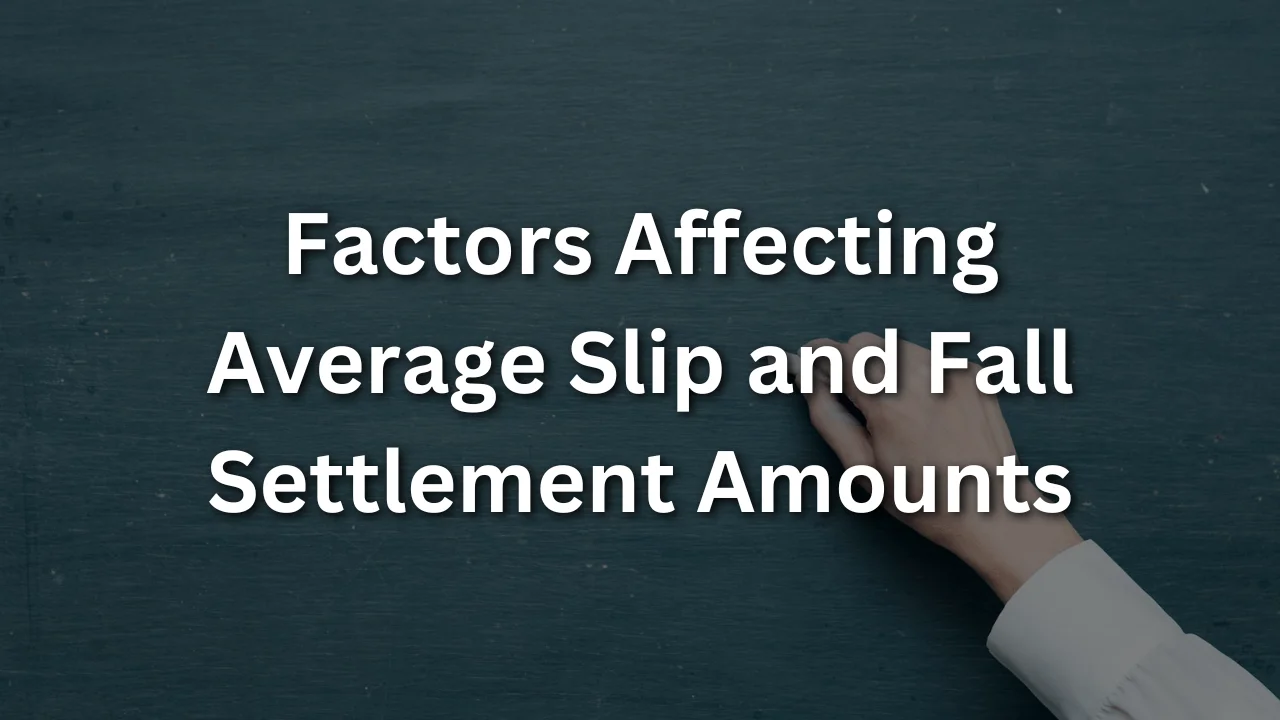You may be surprised to learn that several factors can influence the average slip and fall settlement amounts. From the severity of the injuries sustained to the degree of negligence involved, these variables play a crucial role in determining the compensation you could potentially receive. Understanding these factors can empower you to effectively navigate the legal process and seek a fair settlement for your slip and fall case. So, let’s explore the key elements that contribute to the average slip and fall settlement amounts and equip you with the knowledge you need to protect your rights.

Factors Affecting Average Slip and Fall Settlement Amounts
Slip and fall accidents can result in serious injuries and financial burdens. If you have been involved in such an incident and are seeking compensation, it’s important to understand the various factors that can affect the average settlement amount. By considering these factors, you can better navigate the legal process and ensure that you receive the appropriate compensation for your injuries.
1. Location of the Incident
The location where the slip and fall incident occurred plays a significant role in determining the settlement amount. Different jurisdictions may have varying laws and regulations regarding personal injury cases. Some areas may have a cap on the maximum compensation that can be awarded, while others may have more lenient rules. The overall reputation of the location, such as a history of similar incidents, can also impact the settlement amount.
2. Severity of the Injuries
The severity of the injuries you sustained in the slip and fall accident is another crucial factor in determining the settlement amount. More severe injuries tend to result in higher settlements to account for the medical expenses, pain and suffering, and potential long-term consequences. Injuries that require ongoing medical treatment or have a significant impact on your daily life and ability to work are likely to warrant a larger settlement.
3. Liability and Negligence
Determining liability and negligence is a crucial aspect of any slip and fall case. If it can be proven that the property owner or occupier was negligent and failed to maintain a safe environment, they may be held liable for your injuries. However, if your own negligence contributed to the accident, this can affect the settlement amount. Comparative negligence laws in some jurisdictions may reduce your compensation based on the percentage of fault assigned to you.
4. Evidence and Documentation
The strength of the evidence and documentation you have to support your claim can greatly impact the settlement amount. This includes photographs or videos of the accident scene, medical records, witness statements, and any other relevant documentation. Clear and compelling evidence that clearly establishes the link between the slip and fall accident and your injuries can strengthen your case and increase your chances of receiving a higher settlement.
5. Medical Expenses
The medical expenses incurred as a result of the slip and fall accident play a significant role in determining the settlement amount. This includes not only the immediate medical costs but also any ongoing treatment, rehabilitation, and therapy required. It is important to keep detailed records of all medical expenses, including bills, prescriptions, and invoices, to ensure that you are adequately compensated for these costs.
6. Lost Wages and Future Earning Capacity
If your injuries prevent you from working or result in a loss of income, this can also impact the settlement amount. Lost wages, both past and future, are often taken into consideration when calculating the appropriate compensation. Additionally, if the slip and fall accident has permanently affected your ability to earn a living, the settlement amount may be adjusted to account for the reduced future earning capacity.
7. Pain and Suffering
In addition to the economic damages discussed above, slip and fall settlements may also include compensation for pain and suffering. This includes physical pain, emotional distress, and any other non-economic damages you have experienced as a result of the accident. The settlement amount for pain and suffering is subjective and can vary depending on the severity of your injuries and their impact on your daily life.
8. Contributory Negligence
Contributory negligence refers to any negligence or actions on your part that contributed to the slip and fall accident. In jurisdictions that follow the contributory negligence doctrine, your compensation may be reduced or completely denied if you are found to be partially at fault for the accident. It is important to consult with an experienced attorney to understand how contributory negligence may impact your case and potential settlement amount.
9. Insurance Coverage
The insurance coverage of the responsible party can also affect the settlement amount. If the property owner or occupier has insurance that covers slip and fall accidents, the policy limits will determine the maximum amount of compensation available to you. If the policy limits are low, it may be more challenging to negotiate a higher settlement. However, if the responsible party has substantial insurance coverage, there may be more room for a larger settlement.
10. Legal Representation
Having competent legal representation can greatly impact the outcome of your slip and fall case and the resulting settlement amount. An experienced personal injury attorney will have a thorough understanding of the laws and regulations in your jurisdiction and can navigate the legal process on your behalf. They can negotiate with insurance companies, gather evidence, and present a strong case in court if necessary. With the right legal representation, you can increase the likelihood of receiving a fair and substantial settlement.
In conclusion, several factors can influence the average settlement amount in slip and fall cases. The location of the incident, severity of the injuries, liability and negligence, evidence and documentation, medical expenses, lost wages, pain and suffering, contributory negligence, insurance coverage, and legal representation all play a role in determining the outcome. By considering these factors and seeking the assistance of a knowledgeable attorney, you can optimize your chances of receiving the compensation you deserve for your slip and fall injuries.









